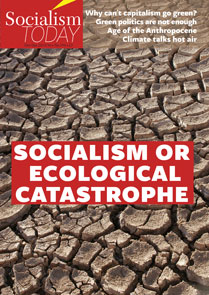 Socialism
or ecological catastrophe
Socialism
or ecological catastrophe
"Even an entire society, a
nation, or all simultaneously existing societies taken together, are not
the owners of the Earth. They are simply its possessors, its
beneficiaries, and have to bequeath it in an improved state to
succeeding generations as good heads of the household". Karl Marx,
Capital, Volume III
The publication of this
special edition of Socialism Today, Socialism or Ecological Catastrophe,
coincides with the 21st United Nations conference (COP 21) on the
environment, held in Paris. Millions around the world will be hoping
that COP 21 will make some progress. It is not hard to predict, however,
whatever the declamatory statements produced by the meeting, that this
conference will end in failure – like previous ones, as Ben Robinson
reports in Climate Talks: Twenty-Five Years of Hot Air (page four). In
any case, it will not produce a legally binding treaty. There will be
agreement on a series of inadequate measures, most of which will not be
implemented anyway.
The major imperialist powers
which dominate the conference will in no way rise to the challenge of
the environmental disaster facing the planet. As Jess Spear shows, A
World of Change (page ten), we are in a period when human society,
dominated by capitalism, has a decisive effect on the planet.
There is strong evidence that
we are approaching a tipping point regarding global warming that may
lead to irreversible damage to the environment, with disastrous effects
on human society. The working class and the poor of the world will be
the main victims. They are afflicted by a multitude of problems: extreme
weather events, flooding or desertification, soil erosion, rising sea
levels, and more. It is not just a question of global warming, but also
pollution and the proliferation of toxins arising from uncontrolled
methods of production and farming.
System failure
The failure of the COP
conferences is not merely the result of poor negotiations. In words,
many political leaders recognise global warming and the need for urgent,
effective measures. Even the executives of some big corporations
recognise the need for action. But the failure of negotiations reflects
the underlying contradictions of capitalism.
The big corporations, as well
as smaller businesses, are dominated by the drive for short-term profit.
They operate according to the laws of competition, nationally and
internationally. They aim to minimise their ‘overheads’, and in reality
they believe that the social costs, wider effects, and long-term
consequences are not their problem. The inability of capitalism to solve
environmental problems effectively is shown by Pete Dickenson, Why Can’t
Capitalism Go Green? (page sixteen).
The current Volkswagen
scandal says it all. One of the world’s biggest carmakers has been
caught out falsifying data on the emissions of its vehicles. However,
the scandal has been seized on by other carmakers to gain advantage over
VW, especially reflecting the intense competition between US and
European vehicle manufacturers.
Marxism and the environment
Marxists are frequently
accused of advocating industrial growth without regard for the
environment. The truth is, however, that Karl Marx was a pioneer when it
came to analysing the relationship between production and nature. He
showed that all wealth was the product of the interaction between labour
and natural resources. There is an active ‘metabolism’ between the
system of production and the environment. Capitalism exploits nature,
just as it exploits the working class.
This is shown in Per Åke
Westerlund’s article, Marxism and the Environment (page twenty-two). It
also answers myths about the Soviet Union. In the first period of the
Russian revolution, the Soviet government took pioneering steps to
protect the environment and conserve natural resources. This was swept
away by the Stalinist bureaucracy, which usurped power from the working
class. The totally undemocratic, bureaucratic management of the economy
under Stalinism led to a wanton destruction of nature in the Soviet
Union. This is not a genuine model for socialism.
The growth of green parties
and environmental movements internationally reflects widespread anger at
the devastation of the environment. But many of these trends focus on
the multiple symptoms of ecological crisis and stop short of advocating
a change in the system. Solutions to the deepening environmental crises
cannot be separated from the struggle to abolish capitalism and
establish socialist production, as explained by Hannah Sell in Green
Parties Are Not Enough (page twenty-eight).
To avert ecological
catastrophe requires a socialist planned economy, run under workers’
democracy. Environmental degradation does not recognise national
borders, and an alternative requires planning on an international basis.
This would provide the basis for social cooperation and human solidarity
on an international level, a prerequisite for the protection of the
environment and the conservation of natural resources.